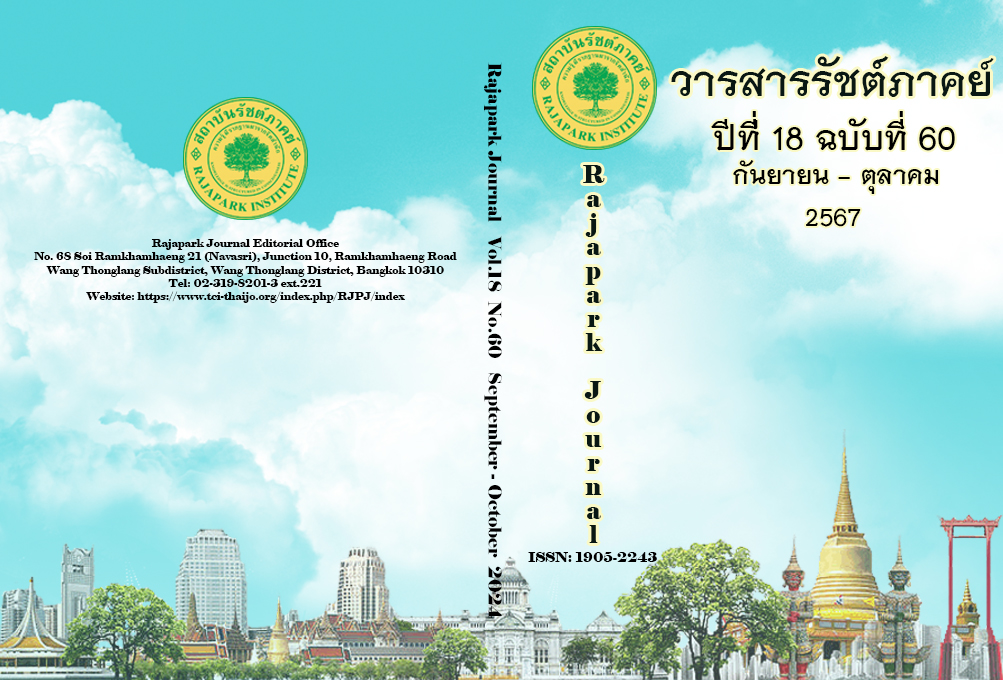The Causal Factors of Organizational Culture Affected Towards Operational Reason Government Medical Staffs
Main Article Content
Abstract
This research aimed to study the influence of causal factors of organizational culture on the performance of government medical schools and to create a model of causal factors of organizational culture on the performance of government medical schools. The data were collected from 5 personnel of government medical schools at the supervisory and operational levels. In-depth interviews were used to analyze the results and appropriate variables. The personnel of government medical schools were 460 people using a questionnaire with a 5-level rating scale. Using a ready-made program, the basic data were analyzed, calculating the mean, standard deviation, skewness, kurtosis, correlation coefficient analysis, conducting confirmatory factor analysis, and assessing model appropriateness. The data analysis results revealed that the causal factors of organizational culture affecting the performance of government medical schools consisted of 5 causal factors: leadership ability, personnel performance, organizational environment, innovation strategy, and organizational culture. It was found that these variables could jointly explain the variance in the effectiveness of government medical schools by 0.861, 0.755, 0.733, 0.711, and 0.679 percent, respectively. Organizational culture had a significant influence on organizational environment, innovation strategy, and leadership ability at the 0.01 level, and organizational environment had a significant influence on personnel performance at the 0.05 level.
Article Details

This work is licensed under a Creative Commons Attribution-NonCommercial-NoDerivatives 4.0 International License.
Views and opinions appearing in the Journal it is the responsibility of the author of the article, and does not constitute the view and responsibility of the editorial team.
References
Ajdarovska, Z., & Attar, M. (2020). Analysing the relationship between organisational culture and organisational ambidexterity. Business & Management Studies: An International Journal, 8(3), 3550-3581. https://doi.org/10.15295/bmij.v8i3.1534
Beyene, T. (2011). Diagnosing Ercoe’s Organizational Culture and Indicating Members’ Preferred Culture. Journal of Asian Business Strategy, 1(5), 73–77. https://archive.aessweb.com/index.php/5006/article/view/4005
Boonphak, K. (2020). Learning management in the new normal era. Journal of Industrial Education, 19(2), A1-A6. https://ph01.tci-thaijo.org/index.php/JIE/article/view/242540
Govender, K. K. (2017). Leadership styles, organisation culture, and employee performance. International Review of Management and Marketing, 7(4), 191-200. https://www.econjournals.com/index.php/irmm/article/view/5230
Guo, Z., Chan, K.C., & Xue, Y. (2016). The impact of corporate culture disclosure on performance: A quantitative approach. Review of Pacific Basin Financial Markets and Policies, 19(2), 1650012. DOI:10.1142/S0219091516500120
Hamzah, S. R., Suandi, T., Ismail, M., & Muda, Z. (2018). Association of the personal factors of culture, attitude and motivation with health behavior among adolescents in Malaysia. International Journal of Adolescence and Youth, 24(2), 149–159. https://doi.org/10.1080/02673843.2018.1482772
Hassan, S. (2021). Organizational effectiveness in both private and publish sectors in Iraqi Kurdistan, the role of organization culture and leadership will be investigated. Turkish Journal of Computer and Mathematics Education (TURCOMAT), 12(2), 218–238. https://turcomat.org/index.php/turkbilmat/article/view/706
Kaya, S., & Secim, H. (2018). Research on the relationship between organization culture and its justice in the health profession. Revista De Cercetare Si Interventie Sociala, 61, 77-90.
Kun, A., Ujhelyi, M., & Hanesz, J. (2017). Students′ perception of organization culture at a faculty of science and technology. Studia Universitatis “Vasile Goldis” Arad-Economics Series, 27(1). DOI:10.1515/sues-2017-0004
Marcillo Indacochea, M. M., Fernández Concepción, R. R., & Lorenzo, A. F. (2018). Management of organizational culture in the public institutions of Ecuador educational sector. Quality Innovation Prosperity, 22(1), 44–57. https://doi.org/10.12776/qip.v1i1.1044
Mesinsee, S. (2020). The world changes, people adapt: Preparing Thais to be complete humans in the post-COVID-19 world. Ministry of Higher Education, Science, Research and Innovation.
Promprakon, K. (2020). Casual factors affecting the success of secondary schools under the office of the basic education commission
[Master’s thesis, Burapha University].
Qazi, S., Miralam, M.S., & Bhalla, P. (2017). Organizational culture and job satisfaction: A study of organized retail sector. Journal of Business & Retail Management Research, 12(1), 215-224. DOI:10.24052/JBRMR/V12IS01/OCAJSASOORS
Quinn, R., & Rohrbaugh, J. (1983). A Spatial model of effectiveness criteria: Toward a competing values approach to organizational analysis. Management Science, 29, 363-377. http://dx.doi.org/10.1287/mnsc.29.3.363
Stacho, Z., Stachová, K., & Hudáková, M. (2017). Employee adaptation as key activity in human resource management upon implementing and maintaining desired organisational culture. Serbian Journal of Management, 12(2), 303-313.
Simon, H.A. (1960). The new science of management decisions. Harper & Brother. http://dx.doi.org/10.1037/13978-000
Sonmez Cakir, F., & Adiguzel, Z. (2020). Analysis of leader effectiveness in organization and knowledge sharing behavior on employees and organization. Sage Open, 10(1). https://doi.org/10.1177/2158244020914634
Sugita, M., & Takahashi, T. (2015). Influence of corporate culture on environmental management performance: an empirical study of Japanese firms. Corporate Social Responsibility and Environmental Management, 22, 182-192. DOI:10.1002/csr.1346
Thongsuk, C. (2019). The quality of work life affecting work efficiency of staffs of Bangkok Area Revenue Office 3[Independent study, Master of Business Administration, Ramkhamhaeng University]. https://mmm.ru.ac.th/MMM/IS/mlw12/6114961036.pdf
Warren, D. E., Gaspar, J. P., & Laufer, W. S. (2014). Is formal ethics training merely cosmetic? a study of ethics training and ethical organizational culture. Business Ethics Quarterly, 24(1), 85–117. http://www.jstor.org/stable/43694989
Whiteside, J., & Dani, S. (2020). Influence of organisational culture on supply chain resilience: A power and situational strength conceptual perspective. Journal of Risk and Financial Management, 13(7), 147. https://doi.org/10.3390/jrfm13070147
Williams, J. (2020). Exploring transformational leadership of principals and the impact on the organizational commitment of teachers in high poverty urban charter schools[Doctoral dissertation, Indiana Wesleyan University].
Wongput. K. (2019). Leadership (4th ed.). B.K. Interprint.
Wyrwicka, M.K., & Chuda, A. (2019). The diagnosis of organizational culture as a change’s factor in the context application of design thinking. LogForum, 15(2), 279-290. DOI: 10.17270/J.LOG.2019.319


